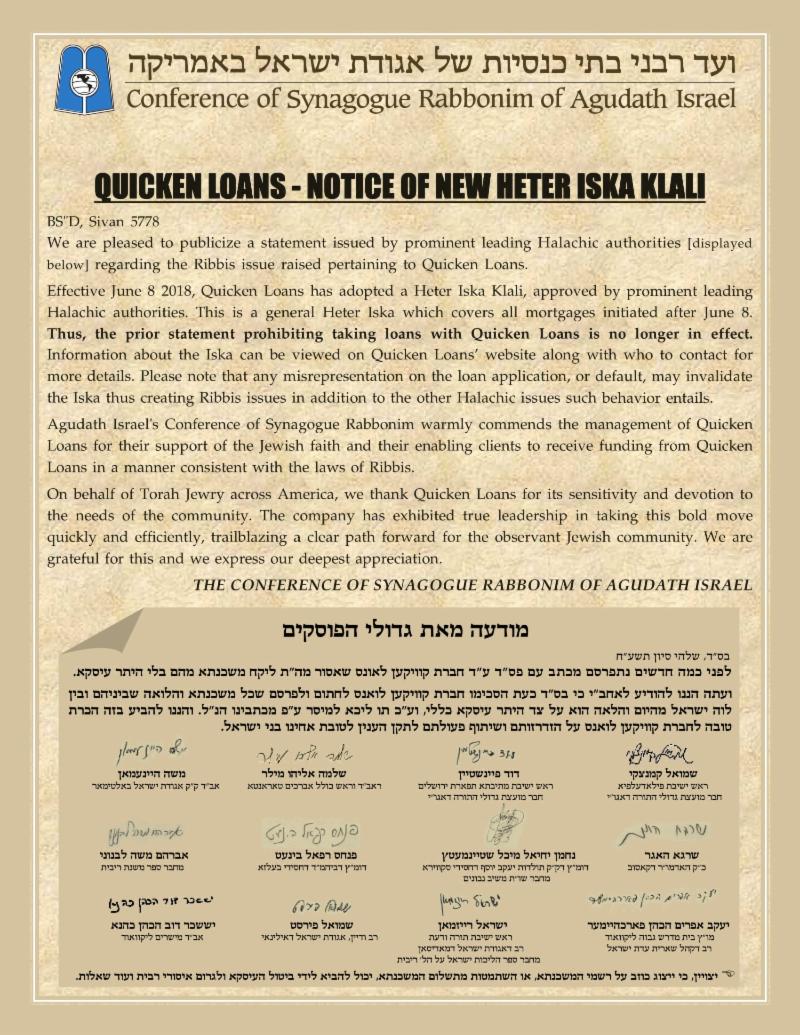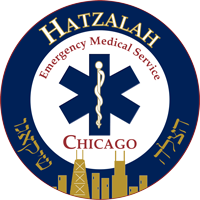Quicken Loans Moves Quickly to Fix Ribbis Issue
At the end of April, the Conference of Synagogue Rabbonim, Agudath Israel of America's rabbinic association, issued a statement warning the Jewish public that loans taken out from Detroit-based Quicken Loans would run afoul of Jewish religious law's prohibition of interest-taking, or ribbis. That issue has now happily been resolved.

A technical solution that can permit problematic loans is a financial arrangement known as a heter iska. The respected rabbinical group is now informing the public that Quicken Loans has approved use of a heter iska, enabling Jews to use the lender without transgressing the ribbis prohibition.
Agudath Israel spokesperson Rabbi Avi Shafran noted that the heter iska does not retroactively reclassify existing loans issued before the heter iska was adopted. Nevertheless, he explained, since Quicken Loans' practice is to sell all loans shortly after origination, many leading halachic authorities approve the continued use of these loans when they are no longer owned by Quicken Loans, without further corrective action.
When the ribbis issue was first raised, Quicken Loans' founder and chairman Dan Gilbert announced that he was assembling a committee to research the subject to, in his words at the time, "find a solution that the observant Jewish community, as well as our legal and capital markets team, finds acceptable." Which he did, resolving the issue.
Rabbi Shafran thanked Quicken Loans for its quick and effective action. "The lender acted with alacrity and responsibility," he said, "and we are happy to notify the public that Quicken has provided a reliable solution for its Jewish customers."
Gary Torgow, chairman of Chemical Bank, the largest bank headquartered in Michigan, knows Mr. Gilbert personally, and expressed his own "great appreciation" for Mr. Gilbert's quick action on the matter. "Dan Gilbert and his team at Quicken Loans wonderfully demonstrated deep sensitivity to the concerns of Jews around the world with his decisive action on this issue."
"I'm extremely gratified," Mr. Torgow added, "that Dan's determination to do what needed to be done will benefit so many members of the Jewish faith."
US Attorney General Announces "Place to Worship Initiative"
Agudath Israel of America welcomed the announcement by Attorney General Jeff Sessions of the "Place to Worship Initiative". Through the Initiative, the Department of Justice, in conjunction with the U.S. Attorney's Offices, will take steps that will strengthen the awareness of the religious protections afforded by the Religious Land Use and Institutionalized Persons Act (RLUIPA). Agudath Israel played an active role on Capitol Hill in crafting and successfully promoting RLUIPA and, since its passage, in litigating cases involving its application.
The Justice Department also announced that it has filed a lawsuit against the Borough of Woodcliff Lake, New Jersey, in which it alleges that the borough and its zoning board violated RLUIPA when it denied zoning approval to Valley Chabad to build a synagogue on its property and proceeded to take steps to keep the congregation from building a house of worship anywhere else in the borough.
Among the most formidable obstacles to the free exercise of religion today relates to the limitations imposed upon synagogues and other houses of worship by local zoning and land use laws. In recent years, several jurisdictions attempted to block the building, buying, renovation and rental of facilities for organized worship and for other religious activities, leading to much public discord in local courthouses and city halls.
More ominously, restrictions on places to worship and other religious entities have been sought and utilized in some cases as a discriminatory means of keeping some religious groups from moving in and settling in specific towns and neighborhoods. This is particularly true in regard to the Orthodox Jewish community, whose Sabbath laws require synagogues to be within walking distance of its adherents, and therefore within, or close to, residential areas. The knowledge that "if you zone out Orthodox synagogues, you zone out Orthodox Jews" has been an ugly reality that our families and communities have had to face.
The Department plans to increase RLUIPA awareness through hosting community outreach events and informational webinars, educating municipal officials and religious organizations, providing additional training and resources for federal prosecutors, and creating a new RLUIPA web page and tool kit, which will contribute to a better understanding of the rights enjoyed by religiously-observant Americans and ultimately to the better safeguarding of those rights.
*
What is a Cisco Model 3600?
Is a Cisco Model 3600 Wireless Access Point a school "capital project to expand high speed broadband or wireless Internet connectivity," or "learning technology hardware for schools, classrooms, and student use?"
Interesting (or comprehensible!) to a non-IT professional - maybe not. But that, and the technical and legal classification of many other hardware expenses was, for yeshivos and nonpublic schools, the $25 million dollar question. Now that question has, finally, gained some clarity.
On November 4, 2014, New York voters approved the Smart Schools Bond Act (SSBA). The SSBA authorized a one-time, $2 billion investment by NYS to improve education in public schools, including a limited allocation for certain technology items for long-term loan to nonpublic schools. By law, whether nonpublic schools are eligible for the value of a certain device depends on its category of technology, which may be subject to interpretation.
But nonpublic school advocacy groups did not know that in early 2016, when the eligibility amounts for nonpublic schools began to surface in draft district plans. Agudath Israel of America, together with its advocacy coalition partners, including Teach NYS, the Jewish Education Project, the Archdiocese of NY, and others, noticed that the numbers seemed suspiciously low. But the explanation was elusive.
That's where the Cisco Model 3600 comes in.
After an exhaustive review of New York City's plan, and a crash course on IT devices, Agudath Israel attorneys began to understand. As Avrohom Weinstock, Esq., chief of staff and associate director of education, put it, "The puzzling figures began to make sense after carefully tracking where the money was being spent, how each device was being classified, and attaining a deeper understanding of how the law dictates it ought to be shared with nonpublic schools."
In fact, in an April 2016 brief on the topic, Agudath Israel uncovered that a significant portion of the hardware purchases had been misclassified to a category which denied nonpublic school use. Further, the Agudah brief showed that the law allows these items to be used by nonpublic schools, and it is logically untenable to bifurcate the use of items and the calculation of the dollars available for that use.
In a later Agudath Israel review of the plans of the nearly 1,000 NYS school districts, the Agudah conclusively demonstrated that some districts in fact classified these same devices correctly, and computed them in the nonpublic school allowance. Clearly, a disparately applied rule of classification across the state could not be legally correct.
But the complex, technical nature of the topic made advocacy in overturning the high-stakes legal concern even more challenging. After significant learning on both sides of the table, the New York State legislature passed Chapters 54 and 59 in the 2017-2018 Enacted Budget, to explicitly include the misclassified devices for nonpublic schools for districts whose plans had not yet been submitted. Further, the new law allocated an additional $25 million, earmarked to nonpublic schools, to compensate those schools in districts whose plans had already been approved. Districts that had initially calculated the devices correctly, or whose plans did not include such devices, will see no change. But others, specifically in New York City, will see a significant increase in the amounts available compared to that first contemplated.
On June 4, 2018, the Smart School Review Board ratified detailed Guidance of this legal change. As this matter is still developing, implementation will not occur immediately, and the Agudah continues to actively pursue this matter.
Special Protection for Hatzalah Members

An eleventh hour push by Agudath Israel of Illinois on the final day of the legislative session yielded positive results for members of the Hatzalah Chicago volunteer emergency medical service, with the unanimous passage of a bill banning insurers from hiking their premiums should they be involved in an accident while responding to an emergency call.
The legislation forbids insurers from raising rates, cancelling policies or refusing renewals to Hatzalah members because of accidents that took place while they were on a call. The new law, an amendment to the Illinois Insurance Code, applies to both automobile insurance and personal umbrella policies and is expected to be signed by Governor Bruce Rauner.
The legislation is modeled after a similar law that already exists in New York offering increased protection to its volunteer EMS crews, explained CEO Tzvi Montrose, one of the founders of Hatzalah Chicago, which has 50 first responders, 20 dispatchers and 15 service and board members.
"We are constantly looking for ways to protect our members so that they don't have to be worried that they will be punished or personally impacted by their volunteerism," said Montrose.




